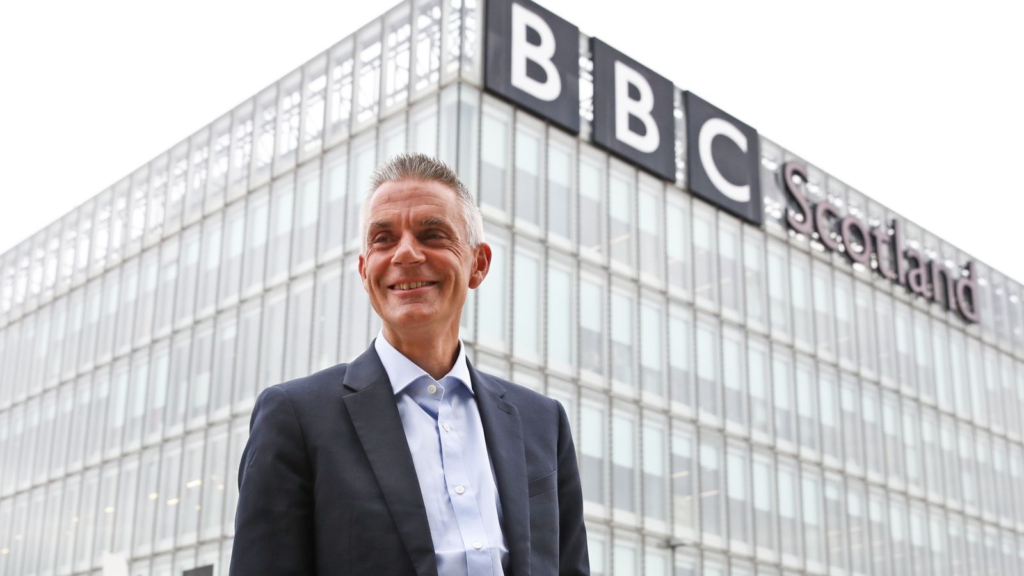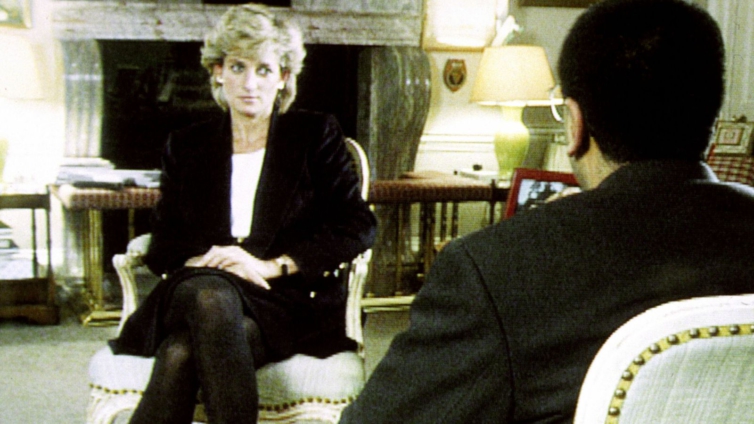The director-general of the BBC has written to staff saying lessons must be learnt following the damning report into the circumstances surrounding the Panorama interview with Princess Diana.
In an internal email, Tim Davie said people across the BBC felt "deeply let down" by the contents of Lord Dyson's 127-page report, which found the corporation covered up "deceitful behaviour" used by journalist Martin Bashir to secure what was described as the "scoop of the decade" in 1995.
He said the findings were "particularly upsetting" given the BBC's commitment to fair and honest journalism.
Mr Davie took over as director-general last year from Lord Hall, who led a 1996 internal inquiry into the interview. He was director of news and current affairs at the time.
Both are facing questions over why Bashir was rehired by the BBC in 2016. The reporter - who became a household name after the Diana interview - left the BBC for ITV in 1999, but returned 17 years later to become religious affairs correspondent and then religion editor.
Mr Davie told staff: "Personally, I am deeply proud of the BBC that I run today, as I know you all are. We should all take pride in continuing to work for the world's leading public service broadcaster.
"Right now, the best way to build and preserve our reputation is to keep delivering outstanding work across the organisation, earning the trust of audiences. Thanks to all of you for continuing to achieve this as we go through this demanding period.
"We have much to reflect on. I know that we now have significantly stronger processes and governance in place to ensure that an event like this doesn't happen again.
"However, we must also learn lessons and keep improving."

His comments come as Prince William made his first public appearance - at a football club in Edinburgh - since both he and his brother, the Duke of Sussex, issued scathing statements regarding the report.
William, the Duke of Cambridge, said the interview had fuelled his mother's "fear, paranoia and isolation" in the final years of her life and damaged her relationship with his father, the Prince of Wales.
Harry also hit out at the corporation, saying: "The ripple effect of a culture of exploitation and unethical practices ultimately took her life."
During a visit to Portsmouth on Friday, Prime Minister Boris Johnson said he was "obviously concerned" by the inquiry's findings", adding: "I can only imagine the feelings of the Royal Family and I hope very much that the BBC will be taking every possible step to make sure nothing like this ever happens again."
Former director of BBC News James Harding, who held the post when Bashir was rehired in 2016, apologised on Friday and said responsibility for the journalist returning to the corporation "sits with me".
Speaking to BBC News, he also sidestepped questions on whether Lord Hall had any role in the rehiring.
Digital, Culture, Media and Sport Committee chairman Julian Knight said he was writing to Mr Davie to ask why Bashir had been allowed to return.
He added: "I want to know how the BBC can reassure the committee that there could be no repeat of the serious failings that have been highlighted by the Dyson report. Now more than ever the BBC must show transparency and honesty in its response. We, the committee, will be discussing these issues when we meet in a private session."
On Friday, former BBC executive Tim Suter, who was part of the 1996 internal investigation, stepped down from his current board role with media watchdog Ofcom.
He had previously been managing editor of weekly programmes in BBC News and current affairs.
Dame Melanie Dawes, Ofcom's chief executive, confirmed he'd stepped down "by mutual agreement" and that the regulator would be entering discussions with the BBC "to ensure that this situation can never be repeated".
Meanwhile, the graphic designer who was tasked with mocking up fake bank documents to help Bashir secure his interview has accused the BBC of "turning their back" on him.
Matt Wiessler said concerns he raised about the way the interview was secured at the time were ignored by bosses.
"It was like I was the guy that pointed out the flaw in something really beautiful, which is a scoop, and I pointed out that something wasn't right," he told Sky News.
Latest Stories
-
Gyakye Quayson advocates refundable visa fees to protect Ghanaian travellers
2 minutes -
On the first lane: Adom Yeboah’s Olympic dreams
11 minutes -
Gov’t set to launch ‘Responsible Mining Programme’ to empower local miners – Lands Minister
12 minutes -
River Guards’ vigilance paying off in galamsey fight – Lands Minister
23 minutes -
Rugby Africa President calls for urgent investment ahead of cup final in Uganda
24 minutes -
Finance Minister justifies decision to delay Covid-19 levy removal
33 minutes -
Between me, God, and a PR disaster: The story of a King’s assault, ego and meltdown
36 minutes -
Gyakye Quayson assures cordial collaboration with Ablakwa despite age gap
40 minutes -
Enterprise Insurance launches ClaimXpress – A new digital claims portal to redefine customer experience
43 minutes -
‘I was dropped because I’m Lebanese’: Fadi Daboussi laments missed role under Akufo-Addo
48 minutes -
Finance Minister to present 2026 Budget to Parliament in October 2025
53 minutes -
Samira Bawumia institutes award scheme for SHS students
53 minutes -
Mahama’s gov’t sees Akufo-Addo administration as having played a key role in stabilising the economy – IMF Report
54 minutes -
New AI Community Center opens in Accra as Google unveils $37m in Africa AI commitments
58 minutes -
We will enforce traffic laws to curb accidents- Dorcas Affo-Toffey
60 minutes

